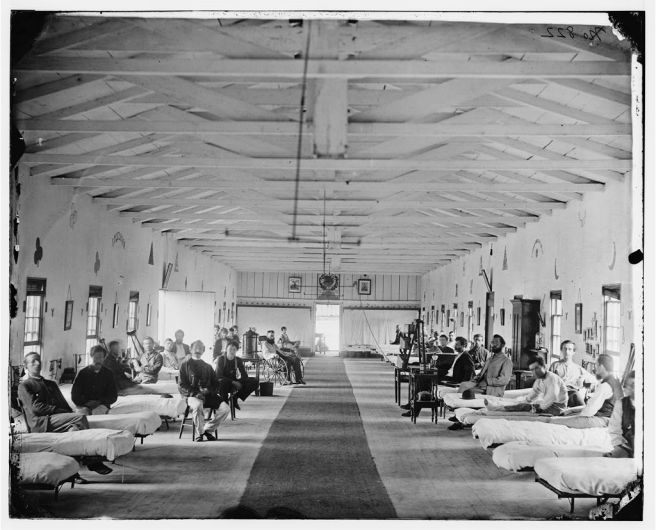Devoted the main part of the day, from 11 to 3.30 o’clock, to Armory-square hospital; went pretty thoroughly through wards F, G, H, and I — some fifty cases in each ward. In Ward H supplied the men throughout with writing paper and a stamped envelope each, also some cheerful reading matter. […]
My custom is to go through a ward, or a collection of wards, endeavoring to give some trifle to each, without missing any. Even a sweet biscuit, a sheet of paper, or a passing word of friendliness, or but a look or nod, if no more. In this way I go through large numbers without delaying, yet do not hurry. I find out the general mood of the ward at the time; sometimes see that there is a heavy weight of listlessness prevailing, and the whole ward wants cheering up. I perhaps read to the men, to break the spell… […]
He who goes among the soldiers with gifts, etc., must beware how he proceeds. It is much more of an art than one would imagine. They are not charity-patients, but American young men, of pride and independence. The spirit in which you treat them, and bestow your donations, is just as important as the gifts themselves; sometimes more so. […]
To many of the wounded and sick, especially the youngsters, there is something in personal love, caresses, and the magnetic flood of sympathy and friendship, that does, in its way, more good than all the medicine in the world… Many will think this merely sentimentalism, but I know it is the most solid of facts. I believe that even the moving around among the men, or through the ward, of a hearty, healthy, clean, strong, generous-souled person, man or woman, full of humanity and love, sending out invisible, constant currents thereof, does immense good to the sick and wounded.
~ Walt Whitman, recounted his wartime experience in a diaristic piece titled “Hospital Visits,” published in The New York Times in December of 1864
Source: Quote – Brainpickings. Passage found in Walt Whitman: Poetry and Prose. Photo: Armory Square Hospital (1865)





 As to me I know of nothing else but miracles,
As to me I know of nothing else but miracles,